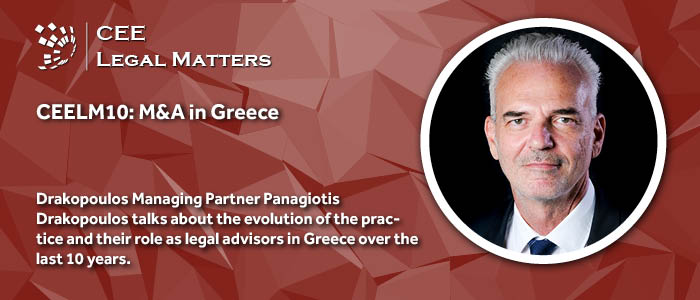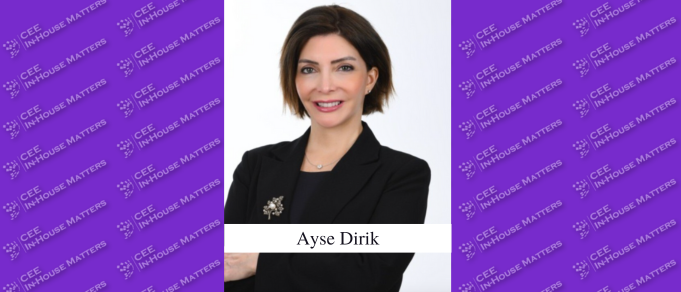Drakopoulos Managing Partner Panagiotis Drakopoulos talks about the evolution of the practice and their role as legal advisors in Greece over the last 10 years.
CEELM: Over the last decade, what types of projects have been the center focus of your M&A team? How has that evolved over time?
Drakopoulos: During this period, the primary focus of our M&A team has been dictated by market demands, with a heavy dependence on FDI. The majority of our transactions have involved foreign investors, contributing to a client mix that is significantly weighted toward international stakeholders. We follow the general market in terms of both highs and lows, but this trend remained consistent both before and after the onset of the COVID-19 pandemic. Our team has primarily been engaged on the buy side, aligning with our concentration on serving foreign clients.
CEELM: Looking back at the last 10 years, what were the specific periods that posed the greatest challenges or intensity for your team?
Drakopoulos: Our most intense periods include the aftermath of the global financial crisis and following the COVID-19 pandemic. The second wave of heightened activity is currently ongoing, and it presents challenges for us in optimizing work efficiency while managing multiple projects simultaneously.
CEELM: How have the client profiles evolved over the last decade – were there any notable shifts and changes observed in the profiles of your clients?
Drakopoulos: The last decade has seen a diversification in the origin of clients, with notable participation from both Europe and the US, while Asian involvement has been relatively low. Local players have become active on the buy side, particularly in sectors undergoing consolidation. Greece stands out as an outlier due to its recent investment grade upgrade, political stability, investor-friendly policies, and its strategic position as the only mature economy in the region. The country’s appeal as a gateway for European investments, Schengen membership, and proactive measures such as tax breaks and streamlined permitting processes have attracted significant strategic investments. Significant developments include companies like AWS, Google, and Microsoft establishing data centers in Greece, attracting numerous other strategic investors.
In terms of investment type, strategic investors have become more prominent in recent years, reflecting a positive shift in Greece’s perception as an investor-friendly and predictable destination.
CEELM: What about clients’ demands and expectations? Have they changed over time?
Drakopoulos: Client needs have evolved with a growing emphasis on practical advice, as deals are executed faster than before. Clients are now more sophisticated and seek added value in understanding the nuances of the Greek market. While the technical aspects are considered standard, differentiation is achieved through personalized guidance and business advice. Pricing dynamics have remained relatively stable over the years.
CEELM: What were the highlights from a legislative and regulatory standpoint, and how has Greece addressed legislative challenges to facilitate deals?
Drakopoulos: In terms of legislation, Greece has tackled the hurdles in facilitating deals through various strategic measures. These include the implementation of a golden visa program, expedited approval processes for projects deemed nationally significant, and the introduction of enticing incentives for digital nomads and the return of Greek entrepreneurs. Moreover, the reduction in corporate tax and dividends tax rates has significantly enhanced the overall landscape, fostering a more conducive environment for deal-making.
CEELM: What is on the horizon? What do you believe will be the highlights in a similar interview 10 years from now?
Drakopoulos: Anyone who attempts to foresee developments in the next decade may find it challenging to do so with certainty. However, there’s a likelihood that managing M&A activities could see a significant shift. Large due diligence processes and teams compiling reports may become more streamlined, possibly leveraging technology and AI for simplification.
The role of a lawyer might transition toward negotiating term sheets rather than focusing on the intricacies of the actual transaction. I believe mundane and repetitive tasks will potentially be eliminated from lawyers’ responsibilities. In terms of work, at least for Greece, the outlook remains optimistic. The future promises to be busy and dynamic; however, making predictions remains a difficult task.
Drakopoulos is CEE Legal Matters' Practice Leader for Corporate/M&A in Greece for 2024 – learn more here.
This article was originally published in Issue 10.11 of the CEE Legal Matters Magazine. If you would like to receive a hard copy of the magazine, you can subscribe here.














